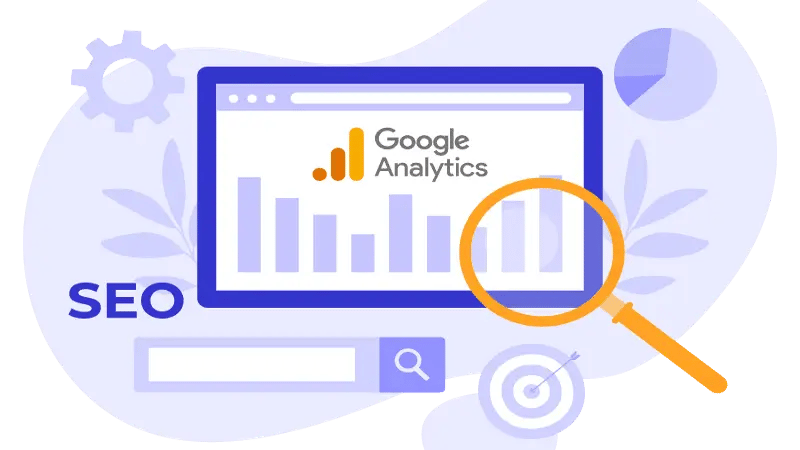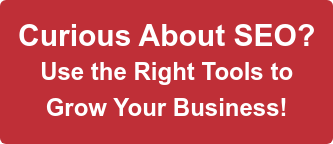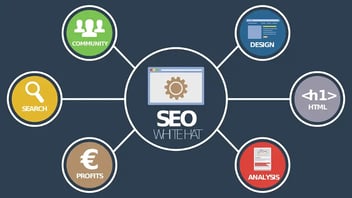Improve Your Search Rankings: Expert On-Page and Off-Page SEO Tactics
Ever wonder why some businesses consistently appear at the top of search results while others struggle to get noticed? The answer often boils down to Search Engine Optimization (SEO), a strategic approach to boosting online visibility.
Why does this matter so much? Because when you perform better in search, you naturally attract more visitors–people actively searching for what you offer–and that leads to winning more customers. To make this happen, we focus on two key areas: what you do directly on your website (on-page SEO) and what you do beyond your site (off-page SEO).
On-Page SEO: Optimizing Your Digital Foundation
Let's delve into the foundational aspects of on-page SEO, the optimizations you implement directly on your website to improve its visibility in search results. Think of this as ensuring your house is in perfect order before inviting guests over–in this case, those guests are search engines and potential customers.
Keyword Research
At the heart of successful on-page SEO lies a deep understanding of keywords–the terms and phrases people use when searching for information online. Thorough keyword research is not just about finding popular words; it's about uncovering the specific language your target audience uses at different stages of their buying journey. By identifying and strategically incorporating these keywords into your website content and structure, you make it easier for search engines to understand what your pages are about and match them with relevant user queries.
Consider this: studies indicate that businesses employing a well-defined keyword strategy experience a 107% increase in organic traffic compared to those that don't.
Keywords aren't one-size-fits-all; it's essential to understand how to use both short-tail and long-tail keywords.
-
Short-tail keywords are typically broad and highly competitive (e.g., "coffee maker"). While they boast high search volume, the intent behind them can be varied. Someone searching for "coffee maker" might be looking to buy, find recipes, or learn about different types.
-
Long-tail keywords, on the other hand, are longer and more specific (e.g., "best drip coffee maker under $100 with a timer"). These phrases have lower search volume individually, but they often indicate a higher level of purchase intent.
A smart keyword strategy involves targeting a mix of both, allowing you to capture broad interest while also attracting highly qualified leads.
Valuable Content (That Ranks)
Once you understand the language your audience uses, the next crucial step is creating high-quality, relevant, and engaging content. Search engines prioritize websites that offer valuable information to their users.
Think about it: their goal is to provide the best possible results for every search query. Therefore, content that is well-written, comprehensive, and offers unique insights is more likely to rank higher. Remember: The freshness and relevance of your content matter. Search engines favor websites that are actively maintained and updated.
The numbers speak for themselves: websites with blogs generate 126% more leads than those without. This highlights the power of consistently creating valuable content to attract and engage your target audience.
Technical SEO
Technical SEO focuses on ensuring that search engine crawlers can easily access, navigate, and understand your website's content.
-
Website speed: Speed is a critical aspect of technical SEO as users have little patience for slow-loading websites. A mere one-second delay in page load time can result in a 7% decrease in conversion rates. Not only does slow speed frustrate users, leading to higher bounce rates, but it's also a negative ranking factor for search engines. Optimizing images, leveraging browser caching, and choosing a reliable hosting provider are just a few ways to improve your site's speed.
-
Mobile-friendliness: With the majority of online searches now happening on mobile devices, search engines prioritize websites that offer a seamless experience across all screen sizes. A responsive website design, which adapts automatically to different devices, is crucial.
-
XML sitemap: Technical SEO also involves ensuring a clear site architecture, creating an XML sitemap (which helps search engines discover all your pages), and utilizing a robots.txt file (which instructs search engine crawlers on which pages to crawl and which to exclude). These elements help search engines efficiently index your content, ensuring users can find it.
On-Page Optimization
Once you have your keywords, great content, and a technically sound website, the next step is to fine-tune specific on-page elements to enhance your visibility further.
-
Title tags and meta descriptions: Title tags and meta descriptions are the first snippets of information potential visitors see in search results. Compelling and keyword-rich title tags and meta descriptions can significantly improve your click-through rates.
-
Header tags: Header tags play a crucial role in structuring your content and signaling its importance to search engines. Incorporating relevant keywords naturally within these headers helps search engines understand the hierarchy and key themes of your content.
-
Image optimization: Image optimization is another often-overlooked aspect. Using descriptive file names and adding relevant alt text to your images not only improves accessibility for visually impaired users but also provides search engines with valuable context about the image content, helping it appear in relevant image searches.
-
Internal linking: Internal linking is crucial for site navigation and distributing link authority (often referred to as "link juice"). Internal links help users discover related content, keep them engaged on your site longer, and signal to search engines the importance of different pages.
Mastering these on-page SEO elements is crucial to establishing a robust online presence and enhancing your search engine rankings. It's about speaking the correct language, providing valuable information, ensuring your website is accessible, and fine-tuning the details that help both users and search engines understand and appreciate your content.
Off-Page SEO: Building Authority and Trust Beyond Your Website
Hand-in-hand with on-page SEO is off-page SEO–the strategies you employ beyond your own website to build authority and trust in the eyes of search engines. Think of this as garnering recommendations and building a strong reputation within your industry.
Backlinks
Backlinks, which are links from other websites to yours, are a cornerstone of off-page SEO. They act as votes of confidence; when a reputable website links to your content, it signals to search engines that your information is valuable and trustworthy. Consequently, pages with a higher number of quality backlinks tend to rank significantly better in Search engines.
However, not all backlinks are created equal. It's essential to differentiate between high-quality and low-quality backlinks. A backlink from a well-respected industry publication with high domain authority carries significantly more weight than a link from a newly created or spammy directory. Search engines are sophisticated enough to discern the value of linking websites. In fact, acquiring numerous low-quality links can sometimes harm your rankings.
Ethical link-building strategies focus on earning backlinks naturally through the creation of valuable content and targeted outreach. Some practical approaches include guest blogging on relevant industry websites, creating pages on your site that others will want to link to, and employing broken link building. These methods prioritize providing value and building genuine relationships within your industry.
Social Signals
While social media engagement may not directly translate into a higher search ranking, it plays a vital role in amplifying your reach and visibility, which can indirectly influence your SEO efforts. Content shared on social media platforms has a 151% higher chance of being discovered and linked to. When your content is shared widely on platforms like LinkedIn, Twitter, and Facebook, it increases its exposure to a broader audience, including other website owners and influencers who may then choose to link to your content as a valuable resource.
Maintaining a consistent and engaging social media presence is key. By regularly sharing your blog posts, engaging with your followers, and participating in relevant industry conversations, you increase the likelihood that your content will be seen and shared. For example, a company that consistently shares insightful blog content on LinkedIn might see industry professionals within their network sharing that content, potentially leading to backlinks from their own websites or blogs.
Brand Mentions
Even when a website mentions your brand name without including a direct link (an unlinked brand mention), it can still contribute to your off-page SEO. These brand mentions act as signals of recognition and authority to search engines. They indicate that your brand is being discussed within your industry, which can enhance your overall credibility and reputation.
Strategies to encourage brand mentions include proactive public relations efforts, such as reaching out to journalists and publications with newsworthy stories, and establishing yourself as a thought leader in your industry by contributing expert insights to relevant platforms and publications.
For instance, if a news article quotes your company's CEO as an expert in a particular field, even without linking back to your website, it increases your brand's visibility and authority in the eyes of both the audience and search engines.
Local SEO
For businesses with a physical location or those targeting a specific geographic area, local SEO is a critical aspect of off-page optimization. Optimizing your Google My Business (now Google Business Profile) listing is paramount. This free tool allows you to manage how your business appears in local search results and on Google Maps. Businesses that fully optimize their Google Business Profile see 94% of their total discovery searches coming from this platform.
Beyond your Google Business Profile, local citations–mentions of your business name, address, and phone number (NAP) on other relevant online directories and websites–play a significant role in local search rankings. Consistency in your NAP information across these citations is crucial. Additionally, online reviews on platforms such as Google, Yelp, and industry-specific review sites have a significant impact on local search visibility and customer trust. Encouraging satisfied customers to leave reviews can boost your local rankings and attract more local business.
Mastering off-page SEO is about building a strong online reputation and earning the trust and authority that search engines value. By focusing on acquiring quality backlinks, leveraging social signals, encouraging brand mentions, and optimizing for local search (when applicable), you can significantly enhance your website's visibility and ultimately improve your search rankings.
The Interplay of On-Page and Off-Page: A Unified Approach
Achieving better search rankings requires understanding that on-page and off-page SEO are not separate tasks but interconnected elements of a unified strategy. You can't effectively pursue one without the other. A solid technical base on your website is crucial; it supports your content and makes your site accessible for link-building efforts to gain traction.
Consider your website as a physical store. On-page SEO is like creating an appealing and well-laid-out storefront and interior, ensuring your products (content) are easy to find and browse for visitors (search engines and users).
Off-page SEO then acts as a positive reinforcement of reviews and word-of-mouth from happy customers, building trust and drawing more people to your store. These external endorsements (backlinks, brand mentions) validate the quality you've established on your site, leading to greater visibility and improved rankings. Both are vital for attracting and keeping customers in the competitive online environment.
The bottom line is this: Boosting your search rankings in the current online environment isn't about treating on-page and off-page SEO as separate tasks. It's about understanding how they connect and amplify each other. Get the on-site elements right to create a strong base, and then build on that with innovative off-site efforts to establish absolute authority.
Are you ready to move beyond current rankings and see tangible business growth? Aspiration Marketing offers expert SEO services designed to achieve these results. Contact our team today to discuss a tailored plan for elevating your online presence.
This content is also available in:
- Deutsch: On-Page- & Off-Page-SEO: So verbessern Sie Ihr Suchranking
- Español: Mejore su posicionamiento SEO: Tácticas SEO On-Page y Off-Page
- Français: Améliorez votre classement SEO : Tactiques SEO On-Page et Off-Page
- Italiano: Migliora il tuo ranking SEO: Tattiche SEO On-Page e Off-Page
- Română: SEO On-Page & Off-Page: Cum să vă îmbunătățiți clasarea
- 简体中文: 提高搜索排名:专业的页面和页面外搜索引擎优化策略











Leave a Comment